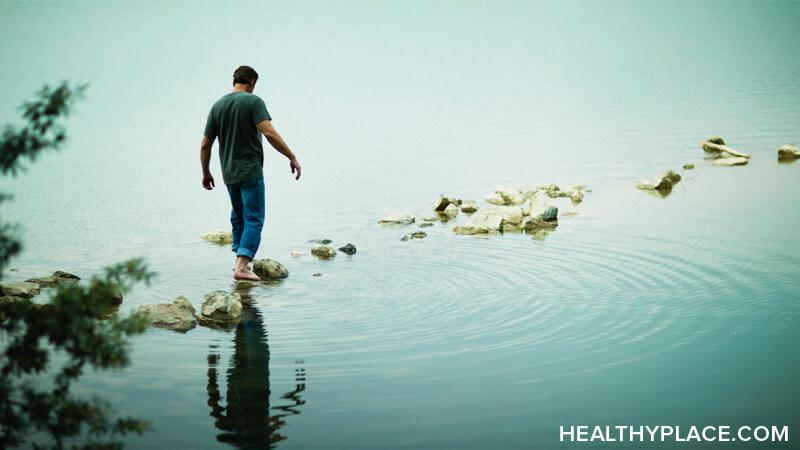8 Ways Mindfulness Calms Anxiety

You may have heard that mindfulness calms anxiety. Sometimes, this can be hard to believe because mindfulness can seem like a trend, like just another passing fad that will soon be replaced by the next craze. Mindfulness has been a part of the human experience for thousands of years, though, so it has long surpassed "trend" status. It has established itself as an integral part of wellbeing. Because mindfulness becomes something you do and a way that you are, you can embrace it and, by engaging in mindfulness, you can calm anxiety.
Mindfulness is living intentionally, on purpose and by choice, in each moment. When you're mindful, you use all of your senses to place your mind--your thoughts and emotions--smack dab in your present moment. You live in the present moment, so you might as well join yourself there and experience it completely.
Mindfulness is a skill that takes practice and patience to fully develop and use naturally. Because it's not always easy, especially at first, is it worth developing? When it comes to anxiety, the simple answer is yes. It works. These eight reasons demonstrate mindfulness's strength over anxiety.
8 Ways Using Mindfulness Calms Anxiety
- Mindfulness changes your perspective. When you're paying attention to your surroundings, you begin to appreciate the beauty and develop gratitude for what is right in this moment. Anxiety doesn't fit here anymore.
- Real, tangible experiences grow larger and more important than worries. Paying attention to your "now" causes "then" and "later" to fade.
- You form a new relationship with yourself. As you pay attention to what's real, you begin to see that you are real, too, and authentic and worthy like anyone and anything else you are present with. Gradually, you replace anxiety about not being good enough, guilt over past mistakes, and assumptions that you'll create problems in something that hasn't even happened with self-acceptance, contentment, and the courage to simply be in the moment.
- Fears don't loom as large. When you're living in the present, your fears aren't there. They're irrelevant, and you can be calm. Or perhaps your fears are there in your moment, but you're living fully anyway. Your fears are still irrelevant.
- Your senses are real and you're thoughts are not. You can't trust your thoughts to be accurate. They're distorted in many ways, and this causes anxiety and misery. You can, however, trust the accuracy of your senses. They're tangible, concrete, and neutral. Mindfulness replaces anxiety with calm.
- Mindfulness interrupts anxious thoughts and overthinking. You can't overthink your anxious thoughts when you're paying attention to where you are in a moment. Continually redirect what you're thinking to what you're sensing to reduce anxiety.
- Living mindfully breaks the cycle of stress and anxiety. Mindfulness-based stress reduction (MBSR) involves changing your focus from your stressors to sensations you're experiencing right now. You learn to stay calm, present, and aware in the face of anxiety and stress rather than reacting in an unhealthy way.
- Mindfulness connects the mind and body. Anxiety creates a disconnect between mind and body. Anxious thoughts race through the mind, while physical symptoms plague the body. When we're anxious, we treat the mind and body as separate parts. When we're mindful, we experience ourselves with our senses and nurture the mind and body wholly.
Just as mindfulness isn't a trend, it's not a quick fix. It's bigger than both. As mindfulness becomes a way of life and a way of being with yourself and your world, the eight ways mindfulness calms anxiety begin to have a positive effect and you just might realize that you're not as anxious anymore.
APA Reference
Peterson, T.
(2019, August 22). 8 Ways Mindfulness Calms Anxiety, HealthyPlace. Retrieved
on 2026, March 5 from https://www.healthyplace.com/blogs/anxiety-schmanxiety/2019/8/8-ways-mindfulness-calms-anxiety
Author: Tanya J. Peterson, MS, NCC, DAIS
I love that you make the point of saying how mindfulness is living your life intentionally, and on purpose. I think this alone is such a huge thing to realize, especially when talking about anxiety. You hit on some truly key areas in the 8 points including, overriding the anxious thoughts, connecting the body with the mind, and shifting perspectives. Almost everyone will experience anxiety in one way or another throughout their lives and this is a great tool to work with.
Thanks, LIzanne! I'm glad you mentioned intention. The more I grow personally and professionally, the more importance I place on living on purpose, intentionally. When we create and apply meaning and do things intentionally, we work our way toward permanent wellbeing (of course, that doesn't mean there won't be problems and ups and downs, but we can handle them better and enjoy life more fully when we make meaning. I'm happy that you like this article as a tool!